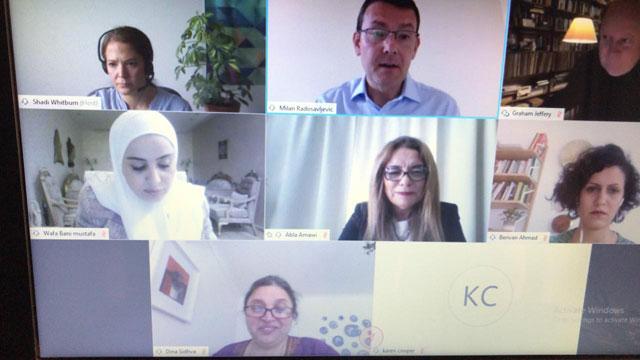You are here
Webinar hears of challenges facing refugee women
By JT - Jul 23,2020 - Last updated at Jul 23,2020

A webinar titled ‘Endangered Lives: The Interlink between Fragility and Gender in the Global South’ was held on Tuesday (Photo courtesy of the HPC)
AMMAN — The Higher Population Council (HPC), in cooperation with the Centre for Women in Protracted Crisis at the University of the West of Scotland, and the Global Refugee Health Research Network (GRHRN) at the University of Edinburgh, held a virtual seminar titled “Endangered Lives: The Interlink between Fragility and Gender in the Global South” on Tuesday.
The webinar, attended by participants from 12 countries, offered an opportunity to look into “the special situation” of refugee women in fragile contexts and the challenges facing them from a gender perspective, according to an HPC statement.
In her presentation, HPC Secretary General Abla Amawi said: “We are now witnessing the highest levels of displacement on record. An unprecedented 79.5 million people around the world have been forced from home as of 2019, including 26 million refugees, 45.7 million internally displaced persons and 4.2 million asylum seekers as per UNHCR statistics.”
The HPC secretary general stressed that countries that host record numbers of refugees require support and solidarity to deal with the far-reaching impact of COVID-19 on the economy and stability in the region, where women and girls face heightened risks due to displacement and the breakdown of normal protection structures and support.
During the session, Amawi gave a historical overview of refugees in Jordan, the key international laws and instruments concerning refugees and the international rights of refugees, the statement said.
Amawi indicated that the HPC is an active member of the GRHRN, which was established in 2019 at the University of Edinburgh, in collaboration with the University of the West of Scotland, as a response to the need to address serious health consequences for people displaced due to war, poverty, political instability, human-rights violations and environmental factors.
Wafa Bani Mustafa, MP and chairperson of the Coalition of Women MPs from Arab Countries to Combat Violence against Women, said in her presentation on “Political Violence Against Women” that according to the Inter-Parliamentary Union, 44 per cent of women parliamentarians in the world receive death and rape threats, and that women who call for legislative amendments to advance women’s rights become the target of defamation campaigns.
Bani Mustafa stressed the need for UN member states to develop international agreements to combat political violence against women, allocate budget resources to enhance the political participation of women, and set up an international fund to support women in specific situations.
The event also hosted Berivan Ahmad, a Syrian refugee, who shared her personal story as a refugee moving from Syria to Lebanon, Turkey, Greece and Germany.
She also talked about the plight of refugee women due to the lack of moral support networks that would help them rebuild their lives in the asylum countries, the statement said.
GRHRN brings together academics, policy makers and practitioners from across the world to address the health needs of refugees, through research and policy development and turning policy into implementable practices.
The newly developed Centre for Women in Protracted Crisis at the University of the West of Scotland focuses on the challenges faced by women experiencing protracted displacement, according to the statement.
Related Articles
AMMAN — The Higher Population Council (HPC) participated in a workshop on "Health Care for Refugees in Humanitarian Crisis Situations" organ
AMMAN — The Higher Population Council (HPC) on Tuesday held a seminar to host national stakeholders to discuss a review on the experiences o
AMMAN — The University of Edinburgh and the University of the West of Scotland on Wednesday announced a partnership with various Jordanian a











